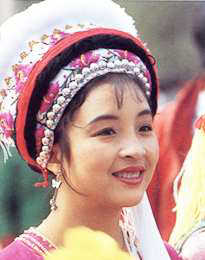 The Bai ethnic minority has a population of 1,594,827 (as of the year 1990), most of which live in the Bai Autonomous County, west of Yunnan Province. The rest are scattered in Sichuan, Guizhou, and Hunan provinces.
The Bai ethnic minority has a population of 1,594,827 (as of the year 1990), most of which live in the Bai Autonomous County, west of Yunnan Province. The rest are scattered in Sichuan, Guizhou, and Hunan provinces.
The language of Bai belongs to the Yi branch of Zang-Mian Austronesian of the Chinese-Tibetan Phylum. They have also invented their own written characters based on the Chinese characters. The language contains a large number of Chinese words due to the Bais' long contact with the Han. Nowadays the Chinese language is the most widely used language among the Bai people.
Ancestors of the Bai nationality lived in Erhai area. Archaeological finds from the Cang'er Site and the Haimenkou Site show that the Erhai area was inhabited as early as the Neolithic Age, and artifacts of that period indicate that the people of the region used stone tools, engaged in farming, livestock rearing, fishing and hunting, and dwelt in caves. Possibly, they began to use bronze knives and swords and other metal tools about 2,000 years ago.
The people in the Erhai area developed closer ties with the Han in inland provinces in the Qin (221-207BC) and Han (206BC-220AD) dynasties. In 109BC, the Western Han Dynasty set up county administrations and moved a large number of Han people to this border area. These people brought more advanced production techniques and iron tools, contributing to the economic development of the area. The Bai aristocrats backed by the Tang (618-907) court unified the people of the Erhai area and established the Nanzhao regime of Yis and Bais.
In successive dynasties, they were named Baizi, Baihuo and Baini, meaning white people. In 1956, they have been formally named the Bai ethnic minority because of their worship of the white color.
The Bai ethnic group is mainly engaged in agriculture and fishery, which have achieved a high level. Over the centuries, the Bais have created a wealth of literary works reflecting their life, work, and struggles against nature and oppression, which provide important data for the study of the history of the Erhai area.
The Bais are very hospitable: they treat their guests to baked tea whenever they come to visit. Colloquially called "Three Courses of Tea", the tea is bitter in the first course, sweet in the second and most memorable after the third. In some places, they add honey and a Chinese spice into the baked tea, which leaves a lingering and refreshing mellow after taste.
The Bai people mainly believe in "Benzhu" (village god). In each village and region, the Benzhu has a different meaning attached to it. Some are referred to the God of Nature, others as national heroes, famous officers, and loyal women. A small group of them also believe in ghosts and Buddhism.
The traditional festivals of the Bai ethnic group include: the March Fair and the Torch Festival. The March Fair, which falls between March 15th and 20th of the lunar calendar, is a grand festival of the Bai ethnic group. It is celebrated every year at the foot of the Diancang Hill to the west of Dali city. It is a fair as well as an occasion for sporting contests and theatrical performances. People gather there to enjoy dances, horse racing and other games.
The Torch Festival is held on June 25. Torches are lit everywhere to usher in a bumper harvest and to bless the people with good health and fortune. Streamers bearing auspicious words are hung in doorways and at village entrances alongside the flaming torches. Villagers, holding aloft torches, walk around in the fields to drive insects away.
